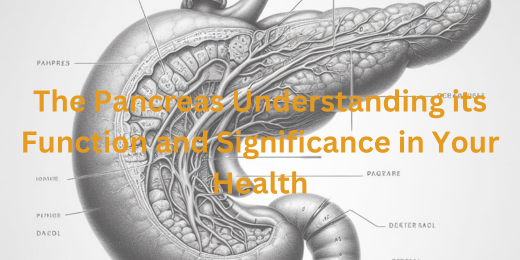The importance of the pancreas
The pancreas is a significant gland in the abdomen that produces hormones and digestive enzymes essential to the body’s health and function. It is required for food digestion and blood sugar control. People who do not have a healthy pancreas can develop serious health problems such as diabetes, pancreatic cancer, and pancreatitis.
Therefore, it’s essential to understand the importance of the pancreas and take care of it. A healthy pancreas can be maintained by eating a well-balanced diet, avoiding alcohol and tobacco, and exercising regularly. Early detection and treatment of pancreatic disorders can also help to avoid serious health problems. Recognizing the warning signs and symptoms of pancreatic disorders, such as nausea, jaundice, and abdominal pain, is critical. Overall, the pancreas’ role in digestion and blood sugar regulation emphasizes its importance in maintaining good health.
Anatomy and Function of the Pancreas
A glandular organ, the pancreas, is situated in the upper abdomen, behind the stomach. It is about six inches long and shaped like a thin pear. Exocrine and endocrine functions are the two primary functions of the pancreas. Exocrine function produces digestive enzymes that aid in the digestion of food in the small intestine. The endocrine system produces hormones such as glucagon and insulin, which regulate blood sugar levels in the body.
The pancreas produces and secretes enzymes and hormones via tiny ducts that connect to the small intestine or the bloodstream. The pancreas works with the liver, gallbladder, and small intestine to aid digestion and nutrient absorption.
The pancreas must function properly in order to maintain good health. Diabetes, pancreatitis, and pancreatic cancer are just a few severe health complications that can result from pancreatic dysfunction. The importance of the pancreas in the body is highlighted by understanding its structure and function, emphasizing the value of proper pancreas care.
Importance of the Pancreas in Maintaining Good Health
The pancreas is a vital organ that aids in digestion, nutrient absorption, and blood sugar regulation. The pancreas secretes enzymes that aid in the digestion of protein, fat, and carbohydrate, allowing the body to absorb essential nutrients. Besides that, the pancreas produces the hormones glucagon and insulin, which regulate blood sugar levels.
The improper pancreatic function can lead to serious health problems. For example, inadequate insulin production can lead to diabetes, while excessive insulin production can lead to hypoglycemia. Pancreatitis, also known as pancreatic inflammation, can be caused by an unhealthy lifestyle or binge drinking.
Since pancreatic cancer is one of the deadliest cancers, a proper pancreatic function is vital for good health. Understanding how the pancreas regulates blood sugar and digestion emphasizes the importance of the pancreas in the body and the need for proper care.
Common Pancreatic Disorders
Pancreatic disorders can be difficult to diagnose and treat due to the wide range of symptoms and causes. The most common pancreatic diseases are pancreatitis and pancreatic cancer.
Pancreatitis is an acute or chronic inflammation of the pancreas. Excruciating stomach pain, nausea, vomiting, and fever are all symptoms of acute pancreatitis. Chronic pancreatitis causes malnutrition and long-term digestive problems. Pancreatitis is typically treated with medication and dietary changes to alleviate symptoms.
Pancreatic cancer is a potentially fatal condition that frequently goes undiagnosed until it is advanced. Possible symptoms include abdominal pain, weight loss, jaundice, and digestive issues. Pancreatic cancer is caused by a complex set of factors, including smoking, obesity, and a family history of the disease. Pancreatic cancer treatment options include radiation therapy, chemotherapy, and surgery. The importance of the pancreas becomes evident when dealing with pancreatic disorders. Pancreatitis and pancreatic cancer pose significant challenges in diagnosis and treatment.
Prevention and Management of Pancreatic Disorders
Maintaining a healthy pancreas is crucial to preserving overall health and avoiding pancreatic disorders. Here are some tips for keeping your pancreas healthy:
Eat a well-balanced diet: A well-balanced diet is critical for preventing pancreatic inflammation and damage. Concentrate on whole foods like fruits and vegetables, whole grains, and lean proteins.
- Avoid using tobacco and drinking too much alcohol: Smoking and alcohol consumption can increase the risk of pancreatitis and pancreatic cancer.
- Exercise frequently: Regular exercise can help reduce inflammation and improve overall health.
If you experience pancreatic disorder symptoms, you should seek medical attention immediately. The type and severity of a pancreatic disorder determine the available treatments. Treatment options include medication, dietary changes, surgery, chemotherapy, and radiation therapy.
Early detection and diagnosis are critical for the successful treatment of pancreatic disorders. Talk to your doctor about screening options if you have a family history of pancreatic disorders or other risk factors. Maintaining a healthy pancreas and overall health depends on prevention and early detection.
Conclusion
The pancreas is an essential digestive organ that also regulates blood sugar levels. It produces hormones such as insulin, which regulate blood sugar levels, as well as the enzymes required for food digestion in the small intestine. If untreated, pancreatic conditions like pancreatitis and pancreatic cancer can be dangerous. Early diagnosis and treatment are critical for the management of these conditions.
To maintain a healthy pancreas, it is recommended to live a healthy lifestyle that includes a balanced diet, regular exercise, and abstaining from tobacco use and excessive alcohol consumption.



